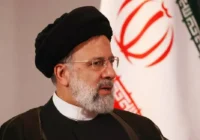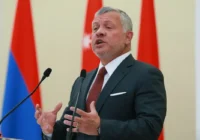“If we don’t go to the Middle East, the Middle East will come to us.” That prophetic comment was once shared with me by an American general defending US policy — now questioned by many in the country, including President Donald Trump — to remain actively engaged actively in the Middle East not only to defend and pursue US interests, but also keep in check the region’s many tensions. To be sure, it has been a costly policy in terms of American and Arab lives, resources and the United States’ image, and it has not always been successful.
The general’s comment comes to mind with the recent drone — perhaps cruise missiles as well, according to reports — attack on two major oil facilities in the heart of Saudi Arabia’s oil-producing area in the eastern part of the country. Houthi rebels have been engaged in a four-year-plus civil war in Yemen, in which Saudi Arabia has played a major role. The latter’s airstrikes have been blamed for a fair portion of the death toll of 100,000. The Saudis and Houthis as well as other participants — the United Arab Emirates, Yemeni government forces and al-Qaeda — have also been blamed for human rights abuses by the UN Human Rights Council.
Negotiations to end the conflict have been fitful and the most recent ceasefire fell apart months ago, just as did previous agreements to stop fighting.
Which brings us to the latest attacks on September 14. The Houthis claimed responsibility for the attacks, but the US is pointing the finger at Iran, though definitive evidence for their claims remains lacking. Nevertheless, their accusations have a certain ring of truth since it is unlikely that the technology to carry out such a long-range attack from Yemen could be obtained by the Houthis without Iranian assistance. The Saudis assert that the drones and cruise missiles were actually Iranian.
Moreover, the Saudis also now contend, as did Secretary Pompeo shortly after the attacks, that they did not originate in Yemen. Predictably, Iran denies all allegations of responsibility for the attacks.
The World Feels Yemen’s Pain
Regardless of the specifics of the attacks in Saudi Arabia, which remain important, the incident marks the third Middle East civil war — after Libya and Syria — that has been internationalized. With the prior two, it was the mass exodus of refugees, first to surrounding countries but then to Europe that sparked blowbacks in the European Union, the US and elsewhere against immigration. The immigration debate doubtlessly played a major role in Britain’s decision in 2016 to withdraw from the EU.
Yemen presents a major challenge to would-be refugees. It is surrounded by one of the world’s most inhospitable deserts — mostly in Saudi Arabia where these refugees are hardly welcome — and by an equally perilous Red Sea and Gulf of Aden. Instead, the allegedly Houthi attacks on two large oil facilities —Abqaiq, one of the world’s biggest that is capable of processing seven million barrels of oil per day — caused tumult in the global oil market, sparking the largest one-day rise in prices in recent memory. The two facilities — Khurais is the other — account for almost 10% of the global oil supply. The Saudis are now expected to bring a significant portion of the oil processed at these two installations back online fairly soon, though not immediately.
Nevertheless, markets remain roiled. A relatively simple weapon, a drone, has rendered the world’s largest oil exporter’s oil-producing infrastructure seemingly defenseless. Recall, also, that Saudi Arabia is the third-highest defense spender in the world after the US and China. Oil buyers are now likely to add an additional risk premium to world oil prices as a result. So, prices seen at the close of business the day before the attacks, around $60 per barrel, may not return for some time unless OPEC producers, Russia, the US and others ramp up production. The OPEC-plus countries — OPEC and Russia — have been reluctant to do that to date in order to maintain a floor price for their exports.
Is Yemen a Factor?
The larger issue, however, is what actions the international community is prepared to take to end this conflict. Judging from its predecessors in Libya and Syria, probably not much. There seems to be no will. That’s especially true of the US, which, under both Barack Obama and Donald Trump, has supplied the Saudis with the weapons used in its aerial bombardment campaign in Yemen. And under Trump, the US voice for ending the conflict has been largely muted.
In fact, since the attacks, it has been the US and Saudi Arabia against Iran. Yemen appears to be barely a second thought, its millions of people all suffering but forgotten in the swirl of accusations and counter-accusations between these three powers. So, the civil war will continue and oil consumers around the world will pay a price for their leaders’ inability to end it — just like Libya and Syria, whose civil wars rage on too.
Other questions surround the attack on Saudi Arabia’s oil facilities. How could such an attack occur in the heart of the world’s largest oil exporter who, despite its outsized defense spending, was unable to protect its most critical asset? While Iran undoubtedly played a role, did it play a direct one?
It is difficult to believe that such an attack by the Houthis, who have received Iranian support over the course of much of the war, on its foe’s most vital strategic facility could have taken place without the knowledge and likely approval of Tehran. And, as the two facilities are some 500 miles from Yemen, is it possible for them to have launched these attacks from that country or might they have originated elsewhere, including Iran or from within the Kingdom of Saudi Arabia itself?
These are hardly academic questions. Their answers will determine the next moves by the US and Saudi Arabia. President Trump has announced stepped-up sanctions on Iran, whose economy is already reeling from existing sanctions imposed after the US withdrew from the nuclear accord in May 2018.
Confrontation, Escalation and Diplomacy
One question on the minds of many is that of military confrontation. On that, two considerations must be taken into account. First, Donald Trump campaigned in 2016 against US involvement in “wasteful, never-ending” US wars in the Middle East. That would pretty much describe a US-Iran conflict.
Perhaps an even more important consideration, however, is that no American lives were lost — no Saudis were killed either — and no US assets were touched in the attacks. So, in the minds of most Americans and probably in that of Trump, where’s the casus belli? Why should Americans risk their lives for a Saudi oil facility, especially when US reliance on imported oil from anywhere outside Canada and Mexico is minimal?
That leaves the Saudi response. Riyadh will certainly respond with reprisal attacks against Yemen, though locating the responsible Houthis will be problematic. Depending on the actual Iranian role and what can be proved, it might decide to launch airstrikes against Iran’s equally vulnerable Gulf-based oil facilities. But that would set both countries on a treacherous path of escalation whose end is unknown.
Such an attack by the Saudis is unlikely without American assent, given the ramifications and likelihood of an Iranian reaction. No one — not the US, Saudi Arabia, Iran, the other Gulf states or the international community — wants or can afford a major war in the Middle East. With the religious overtones (Shia versus Wahhabi Sunni), rocket arsenals of both sides making populations in both countries dangerously exposed, and the critical importance of the Gulf to global oil flows and the global economy, such a conflict ought to be unthinkable. So, why would Iran permit such an attack at all knowing the predictable reaction?
Diplomacy might seem the preferred course now. Indeed, Trump has offered to meet Iran’s President Hassan Rouhani. One possibility might have been at next week’s UN General Assembly, which both leaders are expected to attend. That is probably off the table now.
Nevertheless, some quiet and purposeful diplomacy has never been more necessary. And the place to start may be Yemen’s civil war.
The views expressed in this article are the author’s own and do not necessarily reflect Fair Observer’s editorial policy.
Support Fair Observer
We rely on your support for our independence, diversity and quality.
For more than 10 years, Fair Observer has been free, fair and independent. No billionaire owns us, no advertisers control us. We are a reader-supported nonprofit. Unlike many other publications, we keep our content free for readers regardless of where they live or whether they can afford to pay. We have no paywalls and no ads.
In the post-truth era of fake news, echo chambers and filter bubbles, we publish a plurality of perspectives from around the world. Anyone can publish with us, but everyone goes through a rigorous editorial process. So, you get fact-checked, well-reasoned content instead of noise.
We publish 2,500+ voices from 90+ countries. We also conduct education and training programs
on subjects ranging from digital media and journalism to writing and critical thinking. This
doesn’t come cheap. Servers, editors, trainers and web developers cost
money.
Please consider supporting us on a regular basis as a recurring donor or a
sustaining member.
Will you support FO’s journalism?
We rely on your support for our independence, diversity and quality.






